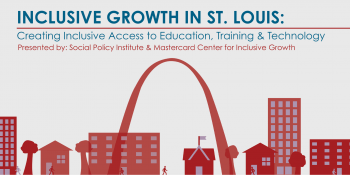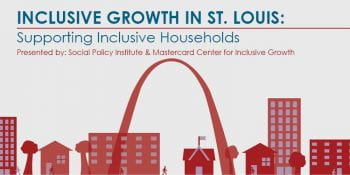The financial technology (fintech) sector has grown rapidly in recent years. Awareness and use of fintech has grown as companies in this sector have increased their user-friendly design, convenience, and accessibility. A unique fintech niche that has developed rapidly alongside the overall industry is known as “employer-channel fintech.” Offered by employers, these solutions or benefits […]
Author: Social Policy Institute
Saving for a Rainy Day: Making it Easier for Employees to Build Emergency Savings
In this study, we examined Onward, an employer-based mobile app that enables workers to save via payroll deduction and receive financial education and coaching as a means to address financial challenges such as difficulty paying bills on time, managing debt, and accruing savings. An important feature of Onward is that employees can save automatically through […]
Financing Workers’ Health Care Cash Flow Needs: A Pilot Study
MedPut offers a way for employees to pay their out-of-pocket health care expenses through payroll deducted or Health Savings Account (HSA) payments capped at 5% of gross pay. Employees that use MedPut are much more likely to report having problems paying medical bills and to report putting off health care due to cost concerns. Nearly […]
Don’t Cash Out or Leave Them Behind: A Pilot Study of a 401k Plan Transfer Digital Platform
In this study, we examined Manifest, a digital platform that makes it easier for employees to transfer 401k retirement accounts when they change jobs. Transferring accounts reduces the likelihood employees cash out and helps them consolidate their retirement savings. We examined 401k plan activity among nearly 15,000 employees of a private university over a four-year […]
From Financial Struggle to Short-Term Financial Relief – An Exploratory Study on Small-Dollar Lending for Low-and Moderate-Income Employees
In this study, we examined HoneyBee, a service company that provides access to 0% APR loans and financial coaching through the workplace. HoneyBee aims to offer employees in need a more affordable credit alternative to payday and auto title loans and therefore help addressing significant cash flow emergencies. Data for this exploratory study included 65 […]
Employer-Sponsored Financial Planning: A Study of the Brightside Platform
In this report, we explore employee usage trends of Brightside, an employee financial health platform that is designed to improve the financial health of working families. Using this platform, employees can open “cases” to address a financial need or goal they have. Brightside connects these employees with financial assistants who, in turn, connect the employees […]
Are Foreclosure Spillover Effects Universal? Variation Over Space and Time
Government intervention in the housing market in response to the 2007–2010 mortgage crisis was driven in part by research showing that foreclosures lower neighboring housing values and thus increase neighbors’ risk of foreclosure. Researchers have consistently identified a negative spillover effect of foreclosures on nearby housing values, but the magnitude of the effect varies widely […]
Women can’t be stopped: Applying resiliency of pandemic struggles to acquire new, high-quality job opportunities
International Women’s Day marks one year since the COVID-19 crisis began. Over the past year, the pandemic drastically cut women from the workforce in the United States and beyond. However, despite all of this, there is a chance for a new opportunity. Women around the world have an opportunity now to apply their resiliency to acquire new skills and re-enter the workforce in industries where they have been historically under-represented.
Fear of safety and mistrust cause vaccine hesitancy in Israel
SPI asked respondents about their inclination to get a COVID-19 vaccine, as well as their perspectives toward the vaccine and pandemic overall. The results indicate certain religious groups are more hesitant to receive the vaccine than others, though the reasoning differs.
Household Spending Patterns and Hardships during COVID-19: A Comparative Study of the U.S. and Israel
The combined supply and demand shocks of the COVID-19 pandemic have created the largest shift in consumer behavior in recent history, while exposing millions of households to material hardships like food insecurity and housing instability. In this study, we draw on national surveys conducted early in the pandemic to investigate the COVID-19’s effects on self-reported […]
The first city in the world to have all its population vaccinated against corona (Links to an external site)
Interview with SPI director, Michal Grinstein-Weiss in Hebrew based on the Socioeconomic Impact of COVID-19 Survey in Israel. A return to almost-normalcy relies on the vast majority of Israelis over age 50 getting vaccinated for COVID-19, but it isn’t happening. New studies explain who isn’t getting the shot, and why.
From intention to action: A systematic literature review of provider behaviour change‐focused interventions in physical health and behavioural health settings
It is clear there are significant delays in the uptake of best practices as part of routine care in the healthcare system, yet there is conflicting evidence on how to specifically align provider behaviour with best practices. Method We conducted a review of interventions utilized to change any aspect of provider behaviour. To extend prior […]
There are three groups of Israelis who fear the vaccine. How can we change the image? (Links to an external site)
Interview with SPI director, Michal Grinstein-Weiss in Hebrew based on the Socioeconomic Impact of COVID-19 Survey in Israel. A return to almost-normalcy relies on the vast majority of Israelis over age 50 getting vaccinated for COVID-19, but it isn’t happening. New studies explain who isn’t getting the shot, and why.
Hundreds of Thousands of Israelis Have Said No to the COVID-19 Vaccine: Why Are They Waiting? (Links to an external site)
Interview with SPI director, Michal Grinstein-Weiss based on the Socioeconomic Impact of COVID-19 Survey in Israel. A return to almost-normalcy relies on the vast majority of Israelis over age 50 getting vaccinated for COVID-19, but it isn’t happening. New studies explain who isn’t getting the shot, and why
Nudging Parents to Improve Children’s Oral Health: A Field Study
This research brief is part of a series by the Social Impact Nudgeathon initiative. This initiative incorporated insights from behavioral economics into the design and delivery of social welfare programs. Developed through a partnership between the Joint Distribution Committee in Israel (JDC-Israel) and the Social Policy Institute (SPI) at Washington University in St. Louis, this initiative is among the first of its kind to launch in Israel. […]
Increasing Successful Completion of Practical Engineering Diploma Programs
This research brief is part of a series by the Social Impact Nudgeathon initiative. This initiative incorporated insights from behavioral economics into the design and delivery of social welfare programs. Developed through a partnership between the Joint Distribution Committee in Israel (JDC-Israel) and the Social Policy Institute (SPI) at Washington University in St. Louis, this initiative is among the first of its kind to launch in Israel. […]
Channel Kan 11 interviews Michal Grinstein-Weiss about the vaccine in Israel (Links to an external site)
SPI director, Michal Grinstein-Weiss, was interviewed by Kan 11 about findings from the Socioeconomic Impacts of COVID-19 Survey in Israel related to the vaccine.
Making inclusive growth a reality in St. Louis (Links to an external site)
As it continues to grow and develop, how can St. Louis ensure benefits are distributed equally throughout the region? Learn about how the Inclusive Growth in St. Louis event series with Center for Inclusive Growth and the advisory committee are addressing this concern.
Creating Inclusive Access to Education, Training & Technology

Watch recording from Feb. 10-11 event, Creating Inclusive Access to Education, Training & Technology, a discussion about the opportunities to create inclusive access to education, training & technology for under-represented populations in St. Louis.
STL 2030 Jobs Plan Panel Discussion
Washington University’s Social Policy Institute and Office of the Executive Vice Chancellor for Civic Affairs and Strategic Planning is pleased to partner with Greater St. Louis Inc. for a panel discussion about the STL2030 Jobs Plan: Driving a Decade of Inclusive Growth. During the discussion, you’ll learn about the draft jobs plan, have the chance to […]
Bold Responses to the Racial Wealth Gap
Please join us 1:00- 2:30 p.m. (CT) on Wednesday, Feb. 17, 2021 for an event sponsored by the Center for Household Financial Stability at the Federal Reserve Bank of St. Louis and the Social Policy Institute at Washington University in St. Louis to explore some of these responses.
Evidence on School Discipline Impacts and Disparities – For Missouri and Beyond
On January 29th, SPI data analyst Jason Jabbari presented at a SLU PRiME Center webinar on his research “The Collateral Damages of Suspensions” which demonstrates that attending high-suspension schools is negatively linked to math achievement and college attendance. Panelists emphasized the need for rigorous research on alternatives to suspensions, such as restorative justice. The webinar guests included: […]
Call for Proposals: Identifying and addressing the challenges of COVID-19 through artificial intelligence, technology, and big data
The Social Policy Institute (SPI) and the McDonnell International Scholars Academy at Washington University in St. Louis are seeking proposals from Washington University researchers and international partners that identify and address the challenges of COVID-19 through artificial intelligence, technology, and big data. Proposals are due by Feb. 26, 2021. This is the second year the […]
All over the Map: A Systematic Literature Review and State Policy Scan of Medicaid Buy-In Programs for Working Individuals with Disabilities
While supports for people with disabilities have increased, significant healthcare and financial barriers persist. State-administered Medicaid Buy-In programs for working people with disabilities, distinct from broader buy-in discussions that have emerged as some states consider expanding access to health insurance, are intended to incentivize employment and protect against a loss of Long-Term Services and Supports. […]
The Challenge of Living Together: Can the Coronavirus Be an Opportunity?
This event has passed. Watch a recording. Michal Granstein-Weiss, director of SPI, and Avital Blonder, founder and CEO of Jindas Association for Urban Urban Renewal, presented at 12:30 p.m. (CT) on January 25, 2021, part of the Shared Israeliness and Social Solidarity lecture series presented by Beit Keinan and the Initiative for Shared Israeliness at the […]
Beyoncé and the NAACP Are Providing Housing Assistance Amid the COVID-19 Pandemic (Links to an external site)
Disparate housing hardship among Latinx and Black households, results from the Socioeconomic Impact of COVID-19 Survey, are featured in this article.
Study: Women with young kids vanishing from the workforce in Israel (Links to an external site)
Director, Michal Grinstein-Weiss, was interviewed by i24News.
Women with young children are disappearing from the Israeli workforce
Women with young children (0-14 years old) are twice as likely to experience unemployment as compared to men in the same situation, according to the longitudinal Socioeconomic Impacts of COVID-19 Survey in Israel, administered by the Social Policy Institute at Washington University in St. Louis.
Housing inequality gets worse as the COVID-19 pandemic is prolonged (Links to an external site)
Kids, Families and COVID-19: A report from Annie E. Casey Foundation (Links to an external site)
A Dec. 14, 2020 report from the Annie E. Casey Foundation features evidence from the Socioeconomic Impacts of COVID-19 Survey from SPI related to child care and working parents.
School breakfast matters for Missouri students
Guest post by Sarah Ritter, manager of public policy, Operation Food Search Child nutrition programs are essential to ending hunger and supporting children’s health, learning and development. One important yet underutilized program is the School Breakfast Program (SBP). Students who eat breakfast at school consume more fiber, calcium and vitamin C – nutrients all children […]
The big victims: One in six mothers working for small children has stopped working (Links to an external site)
Michal Grinstein-Weiss, director of SPI, was interviewed for a story in The Marker, the leading economic publication in Israel, about COVID-19 related job loss and the mental well-being of working mothers in Israel.
Israeli Employers Don’t Forecast Vaccine Will Bring Jump in Hiring (Links to an external site)
Results from the Socioeconomic Impacts of COVID-19 Survey were published in Haaretz, an Israeli publication.
Racial and Ethnic Disparities in Housing Instability during the COVID-19 Pandemic
Stable and adequate housing is critical in the midst of a pandemic; without housing, individuals and families cannot shelter in place to prevent the spread of disease. Understanding and combating housing hardships in vulnerable populations is therefore essential to a sound public health response. This study aims to explore the pandemic’s disproportionate impacts on housing-related […]
Who relocates, where do they move, and why?
The lack of socioeconomic mobility among marginalized populations leads to the concentration of poverty, a long-standing issue in American cities. Empirical studies on neighborhood effects have found that poverty concentration adversely affects the socioeconomic mobility of residents—associated with their economic well-being, employment, education, health, and safety—in lower-income neighborhoods. Through a variety of neighborhood revitalization projects, […]
COVID-19 Educational Inequities: Shining a Light on Disparities in a Graduate School of Social Work
Despite its name, the Housing Choice Voucher (or Section 8) program does not always offer families much choice in where to live. Jenna Hampton, SPI practicum student, calls to expand the choices available to families who want the best for themselves and their children in an editorial with Community Builders Network in St. Louis.
Operation Food Search expands study of food for health benefits (Links to an external site)
St. Louis Business Journal mentioned a new study conducted by SPI, Operation Food Search(OFS), and Medicaid Health Plan. The study aims to determine the effect of Medicaid in promoting food security.
Guest opinion: How to help your employees avoid the perils of payday loans (Links to an external site)
WashU’s research with employee financial wellness programs, specifically related to employee loans, was featured in a recent op-ed with St. Louis Business Journal.
Income Loss and Financial Distress during COVID-19: The Protective Role of Liquid Assets
This study examines how demographic, financial, and intrinsic personality characteristics predict household participation in Israel’s Child Development Account (CDA) program, the Savings for Every Child Program (SECP).
The Far-Reaching Impacts of COVID-19 on the Financial Lives of Israelis – Differences by Religion and Ethnicity
Press Release: October 25, 2020 With a COVID-19 death toll exceeding 2,000, Israel now has one of the highest per capita deaths in the world. Feelings of frustration and despair have resulted in the largest anti-government demonstrations since the establishment of the country, emphasizing that a central crisis during the COVID-19 is a growing divide […]
Moderna Monday – Another vaccine lifts the markets – Again (Links to an external site)
TheStreet cited Social Policy Institute findings of the effect of liquid assets on the likelihood of an individual to practice social distancing.
Three reasons young Israeli adults may face catastrophic, long-term financial burden from COVID-19

Press Release: September 25, 2020 The potentially catastrophic, long-term financial impacts of COVID-19 on young adults are highlighted in the Socioeconomic Impacts of COVID-19 Survey[1] in Israel, which was administered between June 4 and July 1 by the Social Policy Institute at Washington University in St. Louis in partnership with Mastercard. The survey results found […]
A different dialogue: Lifting up community voices

By: Sarah Cowart, communications manager for Social Policy Institute; Pamela Chan, associate director for Social Policy Institute, and Daniel Barker, director of research and knowledge, Mastercard Center for Inclusive Growth If you attended “Building an Inclusive Economy” on October 7 with the Social Policy Institute at Washington University in St. Louis (SPI) and Mastercard Center […]
Women in St. Louis worry about their careers as they step back to care for their families (Links to an external site)
St. Louis Public Radio highlighted survey results from Social Policy Institute’s Socioeconomic Impacts of COVID-19 Survey in the U.S. to elevate evidence that child care concerns are driving job losses and the ability to return to work during the pandemic. Atia Thurman, associate director from the Clark-Fox Policy Institute at Washington University added commentary about policy solutions.
Sustainable finance addresses social justice as COVID-19 raises the stakes (Links to an external site)
S&P Global Ratings, a division of S&P Global, cited Social Policy Institute findings related to COVID-19 and housing hardships in the U.S.
Supporting Inclusive Households in Building Financial Security

Join us virtually for Supporting Inclusive Households in Building Financial Security, 12:30-2:00 p.m. (CT) on Dec. 10, 2020, for a discussion about the opportunities to equitably support the financial situations of households.
Long-term effects of the Coronavirus on the economic situation in Israel (Links to an external site)
Panet, an Israeli media site, cited SPI research of the long-term effects of the Coronavirus on the economic situation in Israel.
Housing mobility programs are an important piece of equitable community development (Links to an external site)
Despite its name, the Housing Choice Voucher (or Section 8) program does not always offer families much choice in where to live. Jenna Hampton, SPI practicum student, calls to expand the choices available to families who want the best for themselves and their children in an editorial with Community Builders Network in St. Louis.
It shouldn’t take a pandemic to increase school meal access for low-income students: A two-step floating catchment area analysis of school meal access during COVID-19
COVID-19 created an additional barrier for students who benefit from free school meals. While some schools attempted to provide alternative meal access points, many students lack adequate transportation. This study examines meal access in St. Louis, MO.
SPI introduces new program with Brown School for students interested in data and statistics

Data and statistics are foundational to policy research and practice. As Social Policy Institute continues to grow, developing opportunities for people to increase knowledge and skills in these areas is a focus of our organization. One example of how we are doing this is a new opportunity led by the Brown School at Washington University in St. Louis and Social Policy Institute: Data and Statistics for Policy Practice.